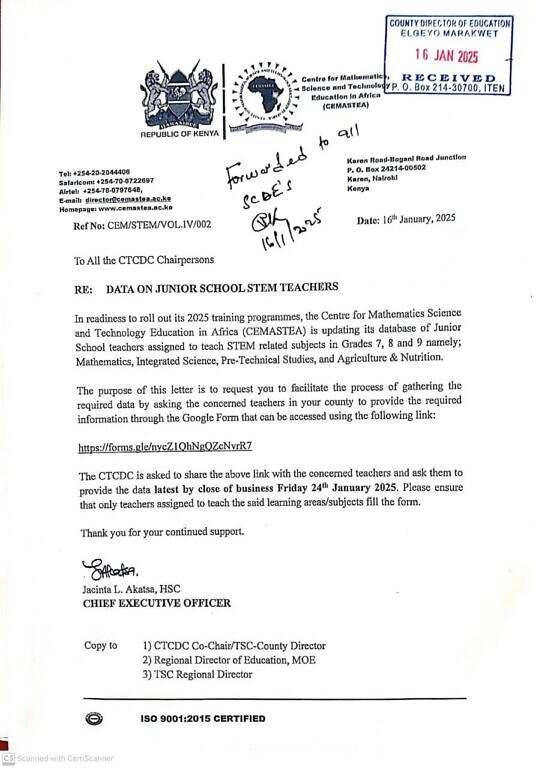
Read more about MWALIMU MAJUU INITIATIVE HERE
The global education landscape has experienced significant transformations in recent years, resulting in an increased demand for qualified teachers in various subjects. Kenyan teachers have emerged as a competitive group in this international market, prompting initiatives that seek to facilitate their employment abroad. One such initiative is the ‘Mwalimu Maju’ policy, which aims to export labor specifically for educators. This program addresses the needs of both Kenyan teachers seeking opportunities overseas and countries in need of skilled teaching professionals.
As part of the ‘Mwalimu Maju’ initiative, the Kenyan government undertakes various strategies to streamline the process for educators aspiring to teach in foreign nations. The policy not only emphasizes enhancing the qualifications of teachers but also focuses on aligning teaching subjects with global demands. As a result, aspiring Kenyan educators have the opportunity to leverage their skills in diverse educational settings across 17 different countries. This framework enhances their career prospects while simultaneously contributing to the global education system by fostering intercultural exchanges.
Additionally, it is crucial to recognize that the demand for Kenyan teachers is not solely based on the subjects they can teach but also on their adaptability and cultural competence within international environments. The roles available often span numerous subjects, addressing the specific educational needs of various regions. By understanding these trends, Kenyan teachers can strategically position themselves within the international job market, taking full advantage of this growing demand for educators.
The following sections will delve deeper into the opportunities and experiences that Kenyan teachers encounter abroad, examining the dynamics of the international teaching landscape and the implications of the ‘Mwalimu Maju’ policy. This exploration will provide insight into how this initiative paves the way for a brighter future for educators seeking to expand their horizons globally.
Why Kenyan Teachers Are in Demand Globally
The global demand for Kenyan teachers is increasingly significant, driven by several key factors that highlight the strengths of the Kenyan education system and the professionalism of its educators. One of the primary reasons contributing to this demand is the high-quality training that Kenyan teachers undergo. The education system in Kenya is well-regarded for its rigorous standards, which enable educators to develop strong pedagogical skills and adapt effectively to various teaching environments. This foundation allows Kenyan teachers to meet international teaching standards, making them attractive candidates for schools around the world.
Moreover, Kenyan teachers possess a remarkable proficiency in English, which is crucial in many global educational settings. English is widely spoken and often used as a medium of instruction in various countries, facilitating communication and comprehension in diverse classrooms. This linguistic advantage not only enhances the teaching effectiveness of Kenyan professionals but also aids in bridging language barriers for students from different backgrounds.
An additional unique aspect of Kenyan educators is their expertise in Kiswahili. As Kiswahili increasingly becomes a language of interest in global discourse, teachers who can impart this knowledge add significant value to educational institutions that aim to teach this vital language. The ability to promote linguistic and cultural fluency in Kiswahili positions Kenyan educators as key assets in international educational contexts.
Furthermore, Kenya is establishing a reputation as a source of skilled labor, particularly in teaching roles. This recognition is contributing to an increasing number of opportunities for Kenyan teachers abroad. Schools and educational institutions in regions with growing student populations, such as the Middle East and parts of Africa, are actively seeking well-trained educators who can deliver quality education. Overall, the combination of high-quality training, English proficiency, and unique language skills showcases Kenyan teachers as highly qualified candidates capable of meeting the global demand for exceptional education.
Categories of Teaching Opportunities for Kenyan Teachers
The global landscape for teaching opportunities has evolved significantly, presenting diverse options for Kenyan educators seeking employment abroad. One prominent category is the demand for English teachers, particularly in countries such as the USA and France, where proficiency in English is paramount. English teachers are often sought after due to the increasing need for effective language acquisition in both academic and professional settings. This trend places Kenyan educators who are fluent in English in a favorable position to secure teaching roles in these regions.
Another notable opportunity arises in the growing interest for Kiswahili language instruction. As globalization continues to forge cultural ties, the need for Kiswahili teachers is becoming increasingly apparent, especially in countries with expanding trade relations and culturally significant connections to East Africa. Educational institutions and language centers are keen to hire qualified Kiswahili educators to foster cross-cultural communication and enhance language diversity in their curricula.
Specialized teaching roles are also available for educators with expertise in special needs education. Many countries have identified a critical shortage of trained professionals capable of addressing the diverse needs of students with disabilities. Kenyan teachers trained in special needs education can leverage their skills to assume these vital positions, thereby contributing positively to inclusive education practices worldwide.
Additionally, there is a notable demand for Islamic religious education and science teachers, particularly in Gulf countries such as Qatar. As these nations strive to strengthen their educational frameworks, they require educators who can deliver quality instruction in Islamic studies and various scientific disciplines. Kenyan teachers with expertise in these areas can find rewarding opportunities that align with regional educational goals.
Overall, the various teaching opportunities available for Kenyan teachers abroad are a reflection of both global educational trends and local needs. These roles not only highlight the versatility of Kenyan educators but also their potential to make significant contributions in international educational contexts.
Benefits and Challenges of Teaching Abroad
Teaching abroad offers a myriad of benefits for Kenyan teachers, appealing both to their professional aspirations and personal growth. One of the most significant advantages is the economic incentive. Many countries provide competitive salaries and benefits that often surpass those available in Kenya. Teachers can enjoy a higher standard of living and the ability to save money or send remittances back home, thereby contributing to their family’s financial stability. This economic opportunity is particularly crucial for teachers who may struggle with low salaries in their home country.
Furthermore, teaching in diverse international environments allows Kenyan teachers to experience advanced educational systems. Exposure to different teaching methodologies and curricular designs enables educators to refine their skills and incorporate best practices into their pedagogy. Such professional growth is invaluable and enhances their teaching portfolio, making them more competitive in both local and global job markets. Alongside this, cultural exchange is another key benefit. Teachers engage with varied cultures, fostering intercultural competence that enriches their teaching approach and broadens their worldviews.
However, alongside these benefits, teaching abroad comes with notable challenges. One primary concern is meeting the qualification requirements mandated by foreign educational systems, which can differ significantly from those in Kenya. In some countries, teachers may need to undergo additional certification or training, leading to significant investment in time and resources. Additionally, cultural adaptation can pose a significant hurdle. Kenyan teachers may face difficulties adjusting to new social norms and educational expectations, which can be overwhelming in a foreign context.
Moreover, the phenomenon of brain drain raises ethical concerns regarding Kenya’s education system. As skilled educators migrate for better opportunities abroad, it can create gaps in the local teaching workforce, impacting the quality of education in their home country. Balancing the benefits of teaching abroad with the challenges involved is essential for Kenyan educators considering such a career path.
Preparing for Opportunities Abroad
As the global demand for qualified educators continues to rise, Kenyan teachers seeking opportunities abroad must take proactive steps to enhance their candidacy. Initially, it is essential to ensure that all educational credentials and certifications align with the requirements of the target country. Many nations have specific accreditation processes, which may vary depending on the subject matter and educational level. Therefore, engaging with the competent authority in Kenya to obtain necessary documentation, such as teaching certificates, transcripts, and degrees, is a crucial step in preparing for a successful teaching career overseas.
In addition to securing qualifications, networking plays a pivotal role in opening doors to teaching positions abroad. Establishing connections with recruitment agencies that specialize in international placements can provide valuable insights and access to job openings. Furthermore, attending teacher fairs, workshops, and seminars focusing on global teaching opportunities can expand one’s professional network and facilitate introductions to potential employers from various countries.
Understanding the legal requirements associated with working abroad is equally important. Each country has its unique regulations regarding work permits, visas, and other documentation necessary for foreign educators. Thorough research on these legalities will ensure smoother transitions and avoid unnecessary setbacks during the application process. Moreover, Kenyan teachers should familiarize themselves with cultural practices and educational systems in the countries they wish to work in, as this knowledge is fundamental to adapting to a new teaching environment.
Lastly, there are various resources and support systems available through the Kenyan government and educational bodies aimed at aiding teachers in this pursuit. These include workshops on international teaching and platforms for connecting with overseas schools. By taking these preparatory steps, Kenyan teachers can significantly enhance their prospects for success when seeking teaching opportunities abroad.
Conclusion
In summary, the ‘Mwalimu Maju’ initiative presents a plethora of opportunities for Kenyan teachers seeking to teach abroad. The program aims to match subjects with the global demand for educators in 17 different countries, thereby addressing the pressing need for qualified teachers while also providing avenues for professional development and cultural exchange. Through this initiative, Kenyan educators can broaden their horizons and contribute positively to the educational landscapes in their host countries.
Nevertheless, it is imperative for teachers to approach these opportunities with a mindful understanding of the associated challenges. Navigating different educational systems, cultural differences, and potential adjustments to one’s teaching style can be daunting. Therefore, educators must adequately prepare themselves to transition into international teaching roles, ensuring they are equipped with the necessary resources and knowledge to thrive in diverse environments. It is recommended to stay informed about key details, including visa requirements, living conditions, and salary packages in the countries of interest.
Teachers are encouraged to actively engage with the resources available for further information, including official policy documents and up-to-date guidelines regarding the initiative. By doing so, they can make informed decisions that align with their career aspirations and personal welfare. We invite readers to share their thoughts and experiences regarding teaching abroad in the comments section below, fostering a community of support and information exchange. Together, let us enhance the discourse surrounding global teaching opportunities and advocate for the professional advancement of Kenyan educators on the international stage.






